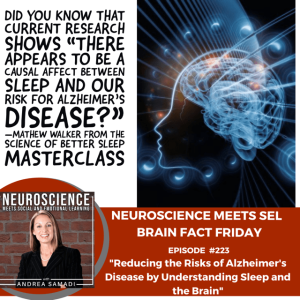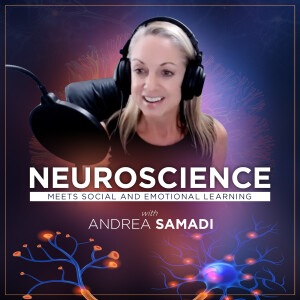
Did you know that according to English scientist and professor of neuroscience and psychology, Mathew Walker, the author of Why We Sleep: The New Science of Sleep and Dreams that current research shows “that there appears to be a causal affect between sleep and our risk for Alzheimer’s Disease?” For this week’s Brain Fact Friday and Neuroscience Meets Social and Emotional Learning Podcast EPISODE #223 we are going to take some of the most noticeable lessons learned from our recent podcast with Dr. John Denboer, on “This is Dementia: Disrupting the Decline”[i] and see what we can learn from Mathew Walker’s most current research. This way, we can take a proactive approach to our sleep, optimizing our potential for learning, memory and retention, and see what we can learn about this devastating disease that affects “6.5M Americans, and is expected to double by 2050.” This topic goes hand in hand with our theme of Season 8 of our podcast: where our focus is on Brain Health and Learning with a look at How an Understanding of Our Brain Can Improve Learning in Ourselves (adults, teachers, workers) as well as our future generations of learners.
On this episode we will cover:
✔︎What is the difference between Alzheimer's and Dementia
✔︎What the most current research says about the connection between Alzheimer's Disease and sleep.
✔︎11 risk factors that we can learn more about to mitigate Alzheimer's Disease.
✔︎A look at the 2 proteins that damage and change the brain.
✔︎What we can do right now to mitigate Alzheimer's Disease by understanding sleep and our brain.
What is Alzheimer’s and What is Dementia?
On our interview with Dr. Denboer, who has spent most of his career working with patients on disrupting dementia, we began our interview defining each of these terms, since many of us aren’t sure exactly what they are, and if we don’t know what they are, how can we be sure we are being proactive with preventing them?
Dementia: is a general term for “decline in mental ability severe enough to interfere with daily life”[ii] and there’s not just one form of dementia. There’s Alzheimer’s, Vascular Dementia, Lewy Body Dementia, Frontotemporal Dementia, and Mixed Dementia.
Alzheimer’s is “a degenerative brain disease that leads to dementia symptoms and gradually worsens over time.”[iii] We opened up our interview with Dr. Denboer with a quote from Dr. Babak Nayeri, a clinical associate professor from the University of Arizona who said “Dementia is not an aging disease; however, it is the most common disease of the aging population.” (from the Netflix documentary, This is Dementia). “Though the greatest known risk factor for Alzheimer’s is increasing age, the disease is not a normal part of aging.”[iv]
11 Risk Facts of Alzheimer’s Disease
One of America’s leading psychiatrists and brain health experts, Dr. Daniel Amen, who we’ve spoken often about on this podcast, believes that Alzheimer’s (that damages the hippocampus or memory center of our brain) and is responsible for “the disease-memory impairment”[v] is “a lifestyle disease similar to heart disease and type 2 diabetes and that our everyday habits contribute to our everyday risk.”[vi] Dr. Amen lists 11 risk factors that increase our probability for Alzheimer’s (with the acronym Bright Minds) and sleep is the S in this acronym. You can read the rest of the risk factors here[vii] but to review them quickly, they are:
B: For blood flow problems
R: For retirement and aging
I: For inflammation
G: For genetics
H: For head trauma
T: For toxins
M: For mental health problems
I: For immune system problems
N: For neurohormone problems
D: For diabesity (that seriously impacts brain health and memory)
S: For sleep that we will dive deeper into today.
Which leads us to this week’s Brain Fact Friday, that we opened up this episode with.
Did you know that according to English scientist and professor of neuroscience and psychology, Mathew Walker, that current research shows “that there appears to be a causal affect between sleep and our risk for Alzheimer’s Disease?” I recently watched Mathew Walker’s The Science of Better Sleep Masterclass[viii] and he explained that a recent study took a person who was sleep deprived (of non-rem sleep) for just one night, the next day “they saw an immediate increase in their blood of that toxic protein beta-amyloid”[ix] which shows “that there appears to be a causal affect between sleep and our risk for Alzheimer’s Disease.” (Mathew Walker).
What are Beta-Amyloids and Tau?
These two proteins are NOT the only factors in Alzheimer’s but since we now know from Mathew Walker that lack of sleep causes amyloid to increase in our blood, I think it’s important to understand what this could do to our brain over time.
To see a full presentation of How Alzheimer’s Affects the Brain[x], I will put a link to a page to review in the show notes. In this article, with a very clear video, you will learn how these two proteins, beta amyloid and tau, become toxic in the brain. You will see how the abnormal tau protein accumulate and eventually form tangles inside neurons, and beta amyloid clumps into plaques, which slowly build up between neurons. This is how Alzheimer’s begins to change the brain, and along with other changes, and inflammation, neurons begin to die, causing the brain to shrink, beginning in the hippocampus, our memory center, which is important for us all for learning.
To conclude this week’s Brain Fact Friday, where we looked at Mathew Walker’s research that shows a causal affect between sleep and our risk for Alzheimer’s Disease, I think a good action step for all of us would be to take a serious look at our sleep to be sure we are getting more than 6 hours each night. Or to at least understand what happens when we do go below 6 hours of sleep/night. I’m sure this will lead you to wonder just how much sleep we should be getting each night? Mathew Walker did cover the importance of sleep with elite athletes saying “sleep may be the greatest legal performance enhancing drug that too few athletes are abusing enough in this modern day and age” and that elite athletes like Lebron James gets 11 hours of sleep each night (a long sleep at night with 1-2 naps in the day) and tennis play Roger Federer gets in between 10-12 hours sleep/day and I’m sure if you ask a sports star with a proven track record how much sleep they get each night, they will talk of the importance of prioritizing sleep.
If you are not an elite athlete, looking to improve performance, Walker recommends 7-9 hours of sleep each night.
There’s a lot more that we can do, but we will cover that on another episode. Until then, I hope this episode shocked you enough (like it did me) to work as hard as I can to make sure we strive for improving our sleep each night, since we know this will affect our future health as a strong Alzheimer’s prevention strategy.
I hope everyone sleeps well this weekend, as we prepare for our much-awaited interview with sleep and dream expert Dr. Baland Jalal[xi], from Harvard.
FOLLOW ANDREA SAMADI:
YouTube Channel: https://www.youtube.com/c/AndreaSamadi
Website https://www.achieveit360.com/
LinkedIn: https://www.linkedin.com/in/samadi/
Facebook: https://www.facebook.com/Achieveit360com
Neuroscience Meets SEL Facebook Group https://www.facebook.com/groups/2975814899101697
Twitter: https://twitter.com/andreasamadi
Instagram: https://www.instagram.com/andreasamadi/
REFERENCES:
[i]Neuroscience Meets Social and Emotional Learning Podcast EPISODE #221 with Dr. John Denboer on “This is Dementia: Disrupting the Decline” https://andreasamadi.podbean.com/e/dr-john-denboer-on-this-is-dementia-disrupting-the-decline/
[ii] Dementia and Alzheimer’s disease: What’s the Difference? https://www.alz.org/alzheimers-dementia/difference-between-dementia-and-alzheimer-s
[iii] ibid
[iv] ibid
[v] Why looking at the whole hippocampus is not enough by Aleksandra Maruszak March 31, 2014
https://www.frontiersin.org/articles/10.3389/fncel.2014.00095/full#:~:text=The%20hippocampus%20is%20one%20of,of%20the%20disease%2Dmemory%20impairment.
[vi] Alzheimer’s is a lifestyle disease by Dr. Daniel Amen Published Nov. 3, 2021 https://www.amenclinics.com/blog/alzheimers-is-a-lifestyle-disease/
[vii] Alzheimer’s is a lifestyle disease by Dr. Daniel Amen Published Nov. 3, 2021 https://www.amenclinics.com/blog/alzheimers-is-a-lifestyle-disease/
[viii] https://www.masterclass.com/classes/matthew-walker-teaches-the-science-of-better-sleep
[ix] ibid
[x] What Happens to the Brain in Alzheimer’s Disease https://www.nia.nih.gov/health/what-happens-brain-alzheimers-disease
[xi] Dr. Baland Jalal https://psychology.fas.harvard.edu/people/baland-jalal
More Episodes
Create your
podcast in
minutes
- Full-featured podcast site
- Unlimited storage and bandwidth
- Comprehensive podcast stats
- Distribute to Apple Podcasts, Spotify, and more
- Make money with your podcast
It is Free
- Privacy Policy
- Cookie Policy
- Terms of Use
- Consent Preferences
- Copyright © 2015-2024 Podbean.com








